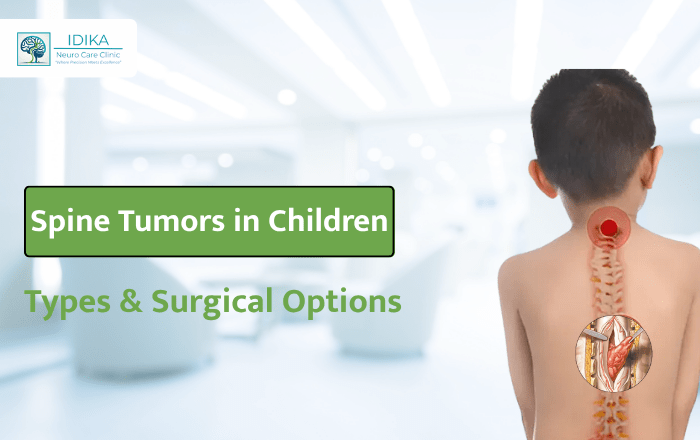When a child complains of back pain, weakness, or trouble walking, it’s easy to think it’s due to a fall or posture. But in some rare cases, these symptoms can point to something more serious—like a spine tumor.
Spine tumors in children are not very common, but they can have serious effects if not detected and treated early. Understanding the types of spinal tumors in children and the different surgical options available can help parents feel more informed and prepared to take the right steps.
This blog will walk you through the common types of pediatric spine tumors, signs to look out for, how they are diagnosed, and the treatments available. We’ll also introduce you to a trusted name in this field—Dr. Harshal Agrawal, a Pediatric Spine Surgeon in Thane at MRR Children’s Hospital.
What Are Spine Tumors in Children?
A spine tumor is an abnormal growth that develops in or around the spinal cord or bones of the spine. In children, these tumors can be either benign (non-cancerous) or malignant (cancerous). Some grow slowly and stay in one area, while others can spread or press on nearby tissues, causing various symptoms.
Spinal tumors in kids are less common than in adults, but when they do happen, they often need careful treatment from doctors who understand children’s growing bodies.
Common Types of Spine Tumors in Children
Spine tumors are grouped based on where they are found in the spine:
1. Intramedullary Tumors
These grow inside the spinal cord itself. Common examples include:
- Astrocytomas: These are the most common spinal cord tumors in children.
- Ependymomas: These grow in the cells lining the spinal cord.
2. Extramedullary-Intradural Tumors
These are located outside the spinal cord but still within the protective layers around it. They include:
- Meningiomas: Tumors that form in the layers covering the brain and spinal cord.
- Schwannomas: Tumors that grow from the nerves.
3. Extradural Tumors
These form outside the spinal cord and its coverings, often in the bones of the spine. Some of these can be bone-related tumors or may spread from other parts of the body (metastatic tumors).
Each type of tumor affects the spine differently, so proper diagnosis is key.
Symptoms of Spine Tumors in Kids
Children may not always be able to explain their symptoms clearly, which makes it even more important to pay attention to warning signs. Some of the most common symptoms include:
- Ongoing back or neck pain
- Weakness in the arms or legs
- Difficulty walking or changes in posture
- Tingling or numbness
- Loss of bladder or bowel control
- Unusual tiredness or balance issues
If any of these signs persist or get worse over time, it’s important to see a specialist.
Diagnosis and Imaging Tests
The first step in diagnosing a spine tumor is a detailed medical check-up and understanding the child’s symptoms. If a doctor suspects a tumor, they will usually recommend imaging tests like:
- MRI (Magnetic Resonance Imaging): This gives a clear picture of the spinal cord and surrounding tissues.
- CT scan (Computed Tomography): Helpful for seeing the bones and tumor placement.
- Biopsy: In some cases, a small sample of the tumor is taken to understand its type.
Early and accurate diagnosis can help guide the best treatment plan.
Surgical Treatment Options for Pediatric Spine Tumors
Surgery is often the main treatment for spinal tumors in children, especially when the tumor is pressing on nerves or causing serious symptoms.
When Is Surgery Needed?
Surgery may be considered if:
- The tumor is growing quickly
- The child is losing movement or strength
- Other treatments like radiation aren’t suitable
Common Surgical Approaches:
- Tumor removal: The surgeon may remove as much of the tumor as possible without harming nearby nerves.
- Spinal stabilization: If part of the bone is removed during surgery, rods or screws may be used to keep the spine stable.
Surgery for children requires special care, both during the operation and after, to help them recover well.
Why Choosing the Right Specialist Matters
Surgery on a child’s spine requires a deep understanding of both the spine and how children’s bodies grow and heal. That’s why choosing a specialist with experience in pediatric spine conditions is so important.
If you are searching for a Pediatric Spine Surgeon in Thane, Dr. Harshal Agrawal at MRR Children’s Hospital has helped many children with spinal tumors. His careful approach and understanding of children’s needs make a big difference in their journey to recovery.
Spine tumors in children may be rare, but they require timely care and the right medical attention. If your child is showing signs of back pain, weakness, or changes in movement, don’t delay in seeking medical advice.
Worried about your child’s spine health? Schedule a consultation with Dr. Harshal Agrawal, a trusted Pediatric Spine Surgeon in Thane at MRR Children’s Hospital. Early support can help your child get back to living a healthy, active life.

